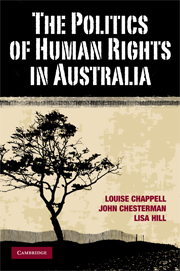Book contents
- Frontmatter
- Contents
- Acknowledgements
- List of abbreviations
- Introduction
- 1 Human Rights
- 2 Protecting Human Rights
- 3 A Bill of Rights?
- 4 Electoral Rights in Australia
- 5 The Rights of Indigenous Australians
- 6 Gender and Sexuality Rights
- 7 Refugees
- 8 Civil and Political Rights in an Age of Terror
- Notes
- Index
- References
1 - Human Rights
- Frontmatter
- Contents
- Acknowledgements
- List of abbreviations
- Introduction
- 1 Human Rights
- 2 Protecting Human Rights
- 3 A Bill of Rights?
- 4 Electoral Rights in Australia
- 5 The Rights of Indigenous Australians
- 6 Gender and Sexuality Rights
- 7 Refugees
- 8 Civil and Political Rights in an Age of Terror
- Notes
- Index
- References
Summary
Even if we are sure that liberal democracy is the best possible regime for the realisation of human flourishing – and no matter how developed a liberal democratic system is – it would be a mistake to assume that justice can be achieved in such a system purely via electoral processes. Given that public decision making in democracies relies upon the approval of a time-poor and imperfectly informed electorate as well as on the actions of representatives who are obliged to accommodate the electorate's preferences in order to retain legitimacy and power, it is unsurprising that democracy turns out to be a rather blunt instrument for the delivery of individual and minority rights. This flawed but unavoidable dynamic between the electorate and its representatives is, undoubtedly, one of the virtues of – and chief justifications for – democracy, but it is also one of its weaknesses.
Despite his enthusiastic advocacy of representative government, British philosopher John Stuart Mill was acutely alert to this reality. Mill endorsed representative democracy because of its tendency to put power into the hands of the majority or, in his words, to admit ‘all to a share in the sovereign power of the state’ (Mill 1991 [1863], 256). And yet, while democracy might ameliorate the problem of tyranny by a select elite, it still held the potential for oppression by the democratic majority over minorities (via ‘the acts of the public authorities’) (Mill 1991 [1863], 8–9; Wolff 1996, 115).
- Type
- Chapter
- Information
- The Politics of Human Rights in Australia , pp. 6 - 26Publisher: Cambridge University PressPrint publication year: 2009

